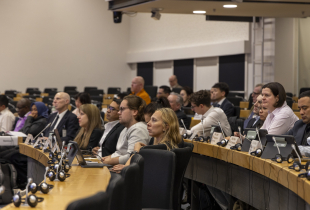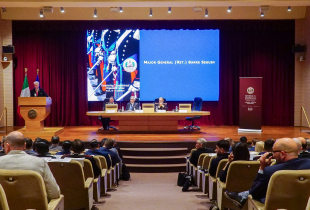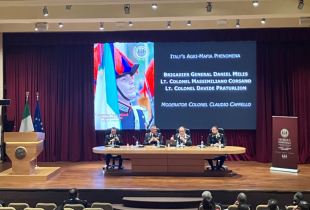
OSD Counternarcotics Programs Director talks to Marshall Center Participants about Military Support to Counter TOC
By Christine June
Public Affairs Office
George C. Marshall European Center for Security Studies
GARMISCH-PARTENKIRCHEN, Germany (April 17, 2015) – David Sobyra, director for Office of the Secretary of Defense’s Counternarcotics and Global Threats Regional Counternarcotics Programs, discusses various methods under which military forces can play a role in efforts at countering transnational organized crime April 15 during his presentation on “U.S. Military Support to Law Enforcement to Counter Transnational Organized Crime” in the Countering Narcotics and Illicit Trafficking resident program at the George C. Marshall European Center for Security Studies here.
Using support to counter-narcotics efforts as a starting point, Sobyra’s lecture describe specific authorities created by the U.S. Congress which enabled U.S. military forces to support civilian drug law-enforcement efforts, both within the United States and overseas. He discussed how the U.S. practice of military support to law enforcement efforts is now practiced in other countries, particularly in the key production and transit zones of South and Central America.
In addition, he talked about the latest evolution of military support to law-enforcement efforts: providing operational centers where interagency cooperation occurs on a standing basis, and where civilian and military efforts can be optimized.
Sobyra described the role of detection and monitoring authorities in permitting the U.S. Military to provide valuable intelligence support and other military strengths that can be provided to law-enforcement; such as logistics, airlift, and strategic planning.
In his current position, Sobyra is responsible for policy development and program oversight for Depart of Defense counternarcotics programs in U.S. Northern Command, U.S. Pacific Command and U.S. Southern Command combatant command areas of responsibility.
Sobyra is a career civil servant with broad policy experience in counternarcotics, stability operations, information sharing, language and culture, and international programs security.
Marshall Center’s CNIT is a two-and-a-half week resident program that focuses on 21st century national security threats as a result of illicit trafficking and other criminal activities. This resident program started April 9 and ends April 24.
Course design includes guest lecturers from national and international law enforcement and security organizations, course seminar activities discussing the range of government countermeasures to combat criminal activity, and strategy development exercises that focus on best practices and international approaches to combating these growing threats against national security.
This year’s CNIT participants hail from: Afghanistan; Albania; Algeria; Argentina; Armenia; Australia; Azerbaijan; Bahamas; Belize; Bosnia and Herzegovina; Bulgaria; Colombia; Czech Republic; Dominican Republic; Egypt; El Salvador; Fiji Islands; Georgia; Greece; Guatemala; Hungary; India; Indonesia; Japan; Jordan; Kazakhstan; Kenya; Kosovo; Malaysia; Maldives; Mauritania; Mexico; Moldova; Mongolia; Montenegro; Morocco; New Zealand; Nigeria; Oman; Peru; Philippines; Romania; Serbia; Slovenia; South Africa: Tanzania; Thailand; Turkey; Ukraine, United States; and, Uzbekistan.
This year’s CNIT course has a good mixture of participants who work at defense, interior and justice ministries, and law enforcement and other government agencies.
The course is designed for government officials and practitioners who are engaged in policy development, law enforcement, intelligence, and interdiction activities aimed at countering illicit narcotics trafficking, terrorist involvement in criminal activity, and the associated elements of transnational crime and corruption. It examines the major methods by which transnational criminal and terrorist organizations engage in illegal narcotics trafficking and other criminal activities for profit.
The mission of the Marshall Center, as a vital instrument of German-American cooperation, is to create a more stable security environment by advancing democratic institutions and relationships; promoting active, peaceful, whole-of-government approaches to address transnational and regional security challenges; and creating and enhancing enduring partnerships worldwide.
The Marshall Center offers eight resident programs that examine complex transnational, regional and international security issues: Program on Terrorism and Security Studies; Program on Applied Security Studies; Program on Security Sector Capacity Building; Seminar on Regional Security; Seminar on Transnational Civil Security; CNIT; Program on Cyber Security Studies; and, Senior Executive Seminar.


